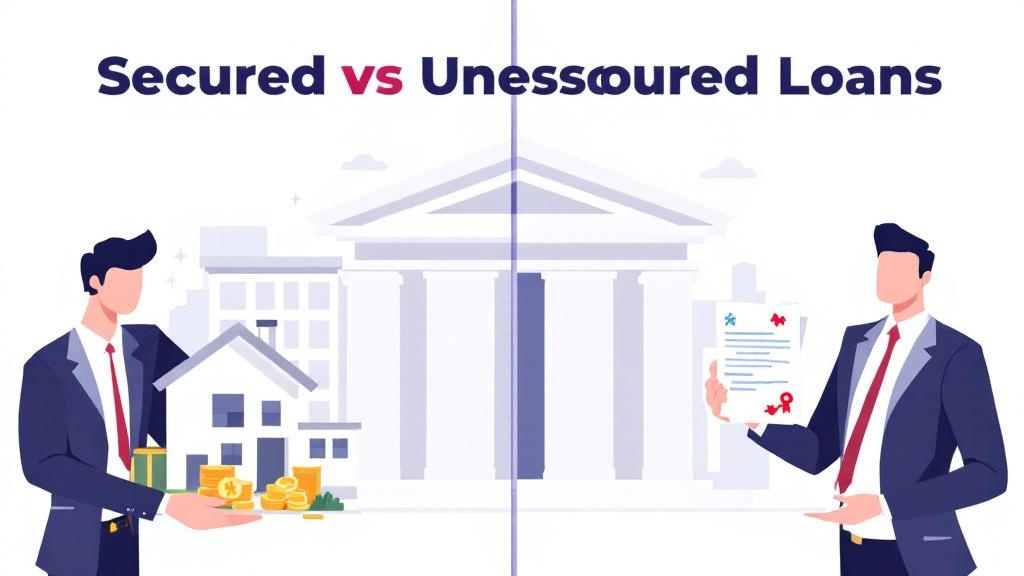When it comes to financing your business, one of the most important decisions you’ll face is whether to opt for a secured or unsecured business loan. The right choice depends on several factors, such as your business’s financial health, your risk tolerance, and how urgently you need the funds.
In this guide, we’ll break down the differences between secured vs unsecured business loans, their advantages and risks, and help you determine which option is best for your business. By the end, you’ll have a clear understanding of the different types of business loans available and the key factors that influence your decision.
What Are Secured Business Loans?
A secured business loan is a type of loan where you offer an asset (such as property, equipment, or other valuable assets) as collateral in exchange for the loan. The lender has the right to claim the asset if you fail to repay the loan on time.
Secured Loan Advantages
Secured loans tend to come with several advantages for businesses:
-
Lower Interest Rates: Since the lender has collateral backing the loan, they face less risk. As a result, secured loans generally come with lower interest rates compared to unsecured loans.
-
Higher Loan Amounts: Offering collateral may allow you to borrow a larger sum. This is especially beneficial for businesses needing significant funding for expansion, equipment purchase, or other large expenses.
-
Longer Repayment Terms: Secured loans often come with more flexible repayment terms, allowing you to repay the loan over a longer period.
Common Types of Secured Loans
-
SBA Loans: Small Business Administration loans are a popular type of secured loan. They require the borrower to provide collateral, but they offer favorable terms for eligible businesses.
-
Term Loans: These loans are typically provided by banks and require some form of collateral.
-
Equipment Financing: If your business needs to purchase or upgrade equipment, this type of secured loan uses the equipment itself as collateral.
What Are Unsecured Business Loans?
On the other hand, unsecured business loans do not require any collateral. These loans are granted based on the borrower’s creditworthiness, business performance, and other financial metrics. Because there’s no collateral backing the loan, unsecured loans generally come with higher interest rates and stricter qualification criteria.
Unsecured Loan Risks
While unsecured loans offer several advantages, there are also risks associated with them:
-
Higher Interest Rates: Since the lender is taking on more risk without collateral, interest rates on unsecured loans are usually higher.
-
Smaller Loan Amounts: Unsecured loans tend to have lower borrowing limits compared to secured loans, which could restrict the funding available for your business.
-
Tighter Eligibility Requirements: Lenders often require a strong credit history and consistent business performance to approve an unsecured loan, making it harder for businesses with less-than-perfect financials to qualify.
Common Types of Unsecured Loans
-
Lines of Credit: This is a revolving credit option that allows businesses to borrow up to a certain limit. It’s an excellent option for short-term financing needs, such as managing cash flow.
-
Term Loans: Similar to secured term loans, but without the collateral. These loans are often used for working capital or other general business needs.
-
Invoice Financing: This type of loan is based on your outstanding invoices. Lenders use your accounts receivable as the primary factor in granting the loan.
Key Differences Between Secured and Unsecured Business Loans
To help you make a well-informed decision, let’s compare secured vs unsecured business loans across key categories:
| Feature | Secured Business Loan | Unsecured Business Loan |
|---|---|---|
| Collateral | Requires collateral (property, equipment, etc.) | No collateral required |
| Interest Rates | Lower interest rates | Higher interest rates |
| Loan Amount | Larger loan amounts | Smaller loan amounts |
| Risk | Lower risk for the lender, as it’s backed by assets | Higher risk for the lender, as it’s not backed by assets |
| Qualification | Easier to qualify for if you have valuable assets | Stricter qualification, often based on creditworthiness |
| Repayment Terms | Longer repayment terms | Shorter repayment terms |
When Should You Choose a Secured Business Loan?
Secured loans are ideal when your business has valuable assets that can be used as collateral, and you need access to a large sum of money. Here are a few scenarios where you might choose a secured loan:
-
You Need Large Loan Amounts: If you’re looking to fund significant expenses, such as equipment purchases or expansion, secured loans allow you to borrow larger sums with more favorable terms.
-
You Have Valuable Assets: If your business owns valuable assets like real estate, machinery, or equipment, securing a loan with these assets can help you get a lower interest rate.
-
You Have Good Credit but Need More Flexibility: If you have a solid business track record and assets to back your loan, secured loans offer the advantage of lower interest rates and more extended repayment periods.
When Should You Choose an Unsecured Business Loan?
Unsecured loans are best suited for businesses that don’t want to risk valuable assets or need a smaller amount of funding. Consider an unsecured loan in these scenarios:
-
You Don’t Have Collateral: If your business lacks significant assets to offer as collateral, an unsecured loan may be the only option available to you.
-
You Need Quick Funding: Unsecured loans, especially lines of credit, can often be approved and disbursed faster than secured loans.
-
You’re Looking for Short-Term Financing: If you need working capital or short-term funding to cover cash flow gaps, unsecured loans can be a good fit, as they’re generally more flexible.
Which Loan is Right for Your Business?
Choosing between a secured vs unsecured business loan depends on your business’s needs, financial situation, and long-term goals. Here’s a quick breakdown to help you decide:
-
Opt for a Secured Loan If:
-
You have valuable assets to offer as collateral.
-
You need a large loan amount or favorable interest rates.
-
You’re willing to take on the risk of using your assets to secure the loan.
-
-
Opt for an Unsecured Loan If:
-
You don’t have collateral to offer.
-
You need quick access to funds for short-term needs.
-
You’re looking for flexibility and don’t want to risk assets.
-
FAQs
1. What is the main difference between secured and unsecured loans for businesses?
The primary difference is that secured loans require collateral, such as property or equipment, while unsecured loans do not require any collateral.
2. Can a small business get an unsecured loan?
Yes, small businesses can qualify for unsecured loans, though the business must have a strong credit profile and demonstrate its ability to repay the loan.
3. What types of assets can be used as collateral for a secured loan?
Common assets used as collateral include real estate, equipment, inventory, and accounts receivable.
4. Are secured loans always better than unsecured loans?
Not necessarily. Secured loans offer lower interest rates, but they come with the risk of losing assets if you default. Unsecured loans, on the other hand, carry higher interest rates but don’t require collateral.
5. Can an unsecured loan be used for large business expenses?
Unsecured loans typically have smaller loan amounts than secured loans, so they may not be the best option for significant expenses like equipment purchases or major expansions.
6. How do I qualify for an unsecured business loan?
Qualification for an unsecured loan depends on your business’s credit score, financial history, and ability to repay the loan. Lenders will assess your business’s risk level before approval.
7. Is it possible to get a business loan with bad credit?
While it’s challenging to get a loan with bad credit, some lenders may offer unsecured loans to businesses with poor credit. However, these loans often come with higher interest rates and stricter terms.
Conclusion
Choosing between a secured vs unsecured business loan is a crucial decision for your business’s financial future. By understanding the key differences, benefits, and risks of both loan types, you can make an informed decision that aligns with your business goals.
If you need a large loan and have valuable assets to back it up, a secured loan could be the right choice. However, if you prefer to avoid using your assets as collateral and need quicker, smaller funding, an unsecured loan might be the way to go.
Ultimately, the decision boils down to your business’s financial situation and needs. Weigh your options carefully, and consult with a financial advisor to ensure you’re choosing the best loan for your business’s unique circumstances.








Comments (0)